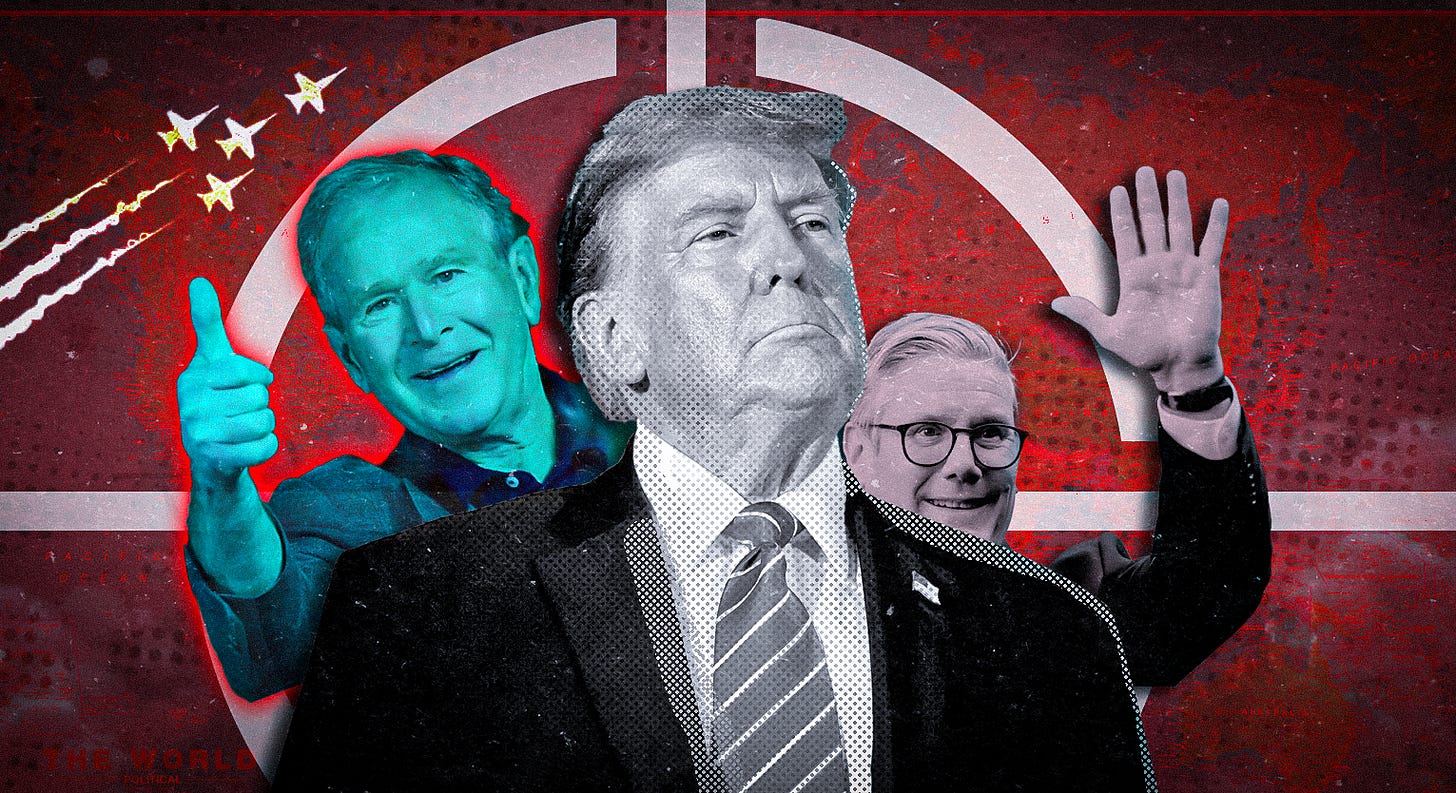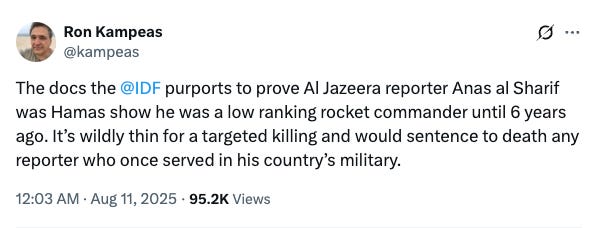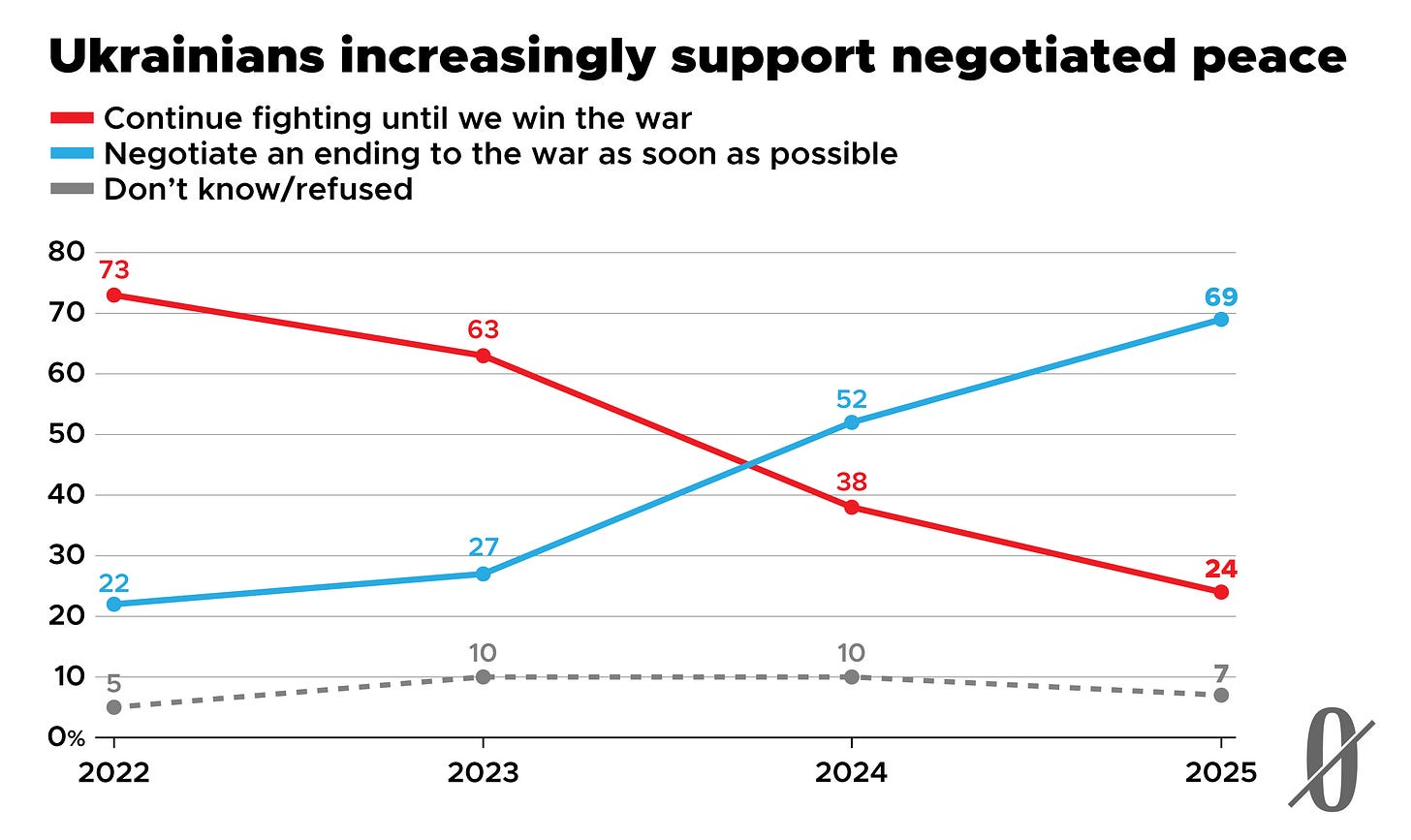The War on Terror is Back!
Plus: White House fight club, moon race redux, partisan robots, sneaky jellyfish, and more!
—Six months after designating several Latin American cartels as foreign terrorist organizations, President Trump has authorized the military to bomb them, the New York Times reports. A retired admiral told the Times that such attacks, which haven’t been approved by the countries in which the cartels are based, would be a “major breach of international law.” And any attempt to “bomb the cartels into submission” is doomed to fail, argues Dan DePetris in Responsible Statecraft, citing, among other evidence, America’s failure to significantly curb heroin production by bombing poppy fields during the Afghanistan war.
—The Trump administration plans to designate the Muslim Brotherhood, a globe-spanning Islamist movement, as a foreign terrorist organization. The move would target an organization embedded in the mainstream of Arab political and social life, proscribing many interactions with it as “material support” for terrorism, a felony under US law. In 2017, when Trump was first considering such a designation, experts at the Carnegie Middle East Center warned that many Muslims would view it “as a declaration of war against non-violent political Islamists—and indeed against Islam itself.”
—British authorities arrested more than 500 people, including a priest and many senior citizens, for rallying in support of Palestine Action, an activist group that the UK designated as a terrorist organization after some of its members snuck into a military base and sprayed several planes with red paint. Despite severe criticism of the Palestine Action terrorism designation from the British left and the human rights chief of the UN, the British government stands by its decision, arguing that “many people may not yet know the reality of this organization.” The designation, which took force on July 5, makes it illegal not only to belong to the group but to “encourage support” for it, which includes things like wearing a T-shirt that says “Support Palestine Action.”
—In a bid to beat Russia and China, which have said they’ll jointly develop a nuclear power plant on the moon by the mid-2030s, NASA plans to unveil a lunar nuclear reactor by 2030. Acting NASA Administrator Sean Duffy, who hopes to place the plant on the moon’s south pole, said the US should “claim that for America” and declare a “keep-out zone.” Scholars of space law and nuclear physics have expressed concern about the project. And a report in the New York Times notes that “it is… not clear what the nuclear reactor will power.”
—China says it “drove away” a US Navy destroyer that sailed near Scarborough Shoal, an atoll in the South China Sea claimed by both China and the Philippines. US officials disputed this characterization but offered no elaboration aside from saying the US ship had been conducting a freedom of navigation operation—the first known American naval operation near the shoal in at least six years. The incident came two days after a pair of Chinese ships collided near Scarborough Shoal while attempting to expel a Philippine military vessel from the area.
—American policymakers and AI companies fear that China’s increasingly popular “open source” AI models may eclipse such closed source US models as ChatGPT and so are “mobilizing their responses to the threat,” reports the Wall Street Journal. The article features no detailed explanation of what exactly the threat is but says “US officials worry that if Chinese AI models dominate the globe, Beijing will figure out a way to exploit it for geopolitical advantage.” Two days after the article’s publication, the National Science Foundation announced a $75 million grant to the Allen Institute for AI to pursue an open source project. As it happens, the guest on the episode of the NonZero podcast released that day was Nathan Lambert of the Allen Institute, who addressed many aspects of the open source AI issue—beginning with the question of what exactly “open source AI” is.
—When University of Amsterdam researchers unleashed 500 ChatGPT-powered chatbots—each with a distinctive persona—on a simulated social network and observed them for a while, they noticed some familiar patterns: “(1) partisan echo chambers; (2) concentrated influence among a small elite; and (3) the amplification of polarized voices.” Hoping to engineer a better outcome, the researchers tried interventions like hiding “likes” and algorithmically handicapping initially viral posts—but to little avail. The researchers concluded that the polarizing effect of social media may not be correctable via algorithmic amendments and may be “rooted in the very architecture of social media platforms: networks that grow through emotionally reactive sharing.”
—A new law in Illinois prohibits licensed therapists from using AI to help formulate treatments or communicate with clients. Enforcement will be complaint-based and can involve fines of up to $10,000. The legislation, which follows similar laws in Nevada and Utah, comes in the wake of several high-profile cases of chatbots allegedly pushing users into spirals that led to psychosis and even suicide.
—Reporters and editors at Politico both say the outlet’s AI-generated reports haven’t been entirely reliable—but only one side thinks that’s a big problem. Some of Politico’s AI-produced updates from the 2024 Democratic National Convention and vice-presidential debate (which were labelled as AI-produced) contained factual errors and were taken down without correction or retraction, flouting standard journalistic practices. In an arbitration hearing covered by Nieman Lab, reporters contended that this violated their union contract, which says that if AI is used to “supplement or assist in… newsgathering,” this “must be done in compliance with Politico’s standards of journalistic ethics and involve human oversight.” Management, however, says that what the AIs were doing wasn’t “newsgathering” and that the AIs exist, as one editor put it, “outside the newsroom.”
Israel targeted and killed prominent Gazan journalist Anas Al Sharif—and killed four of his Al Jazeera colleagues in the process—on grounds that he was secretly a Hamas militant. Al Jazeera, rights groups, and journalists around the world have rejected Israel’s claim, which brings us to our tweet of the week, from Ron Kampeas, the former DC bureau chief of the Jewish Telegraphic Agency and a multi-time NonZero podcast guest:
—As today’s summit between President Trump and Russian President Putin approached, Russian forces made a significant breach of defensive lines in eastern Ukraine, advancing several miles near the strategically important city of Pokrovsk. Ukraine, meanwhile, has stepped up attacks against Russian oil infrastructure, and Trump, apparently trying to increase pressure on Moscow, put steep tariffs on India for importing Russian oil. All sides sought to temper expectations for diplomatic progress, though Ukraine, in an apparent first, said it would be open to territorial concessions following a ceasefire.
—Humanitarian aid is collapsing in African refugee camps as US foreign aid cuts continue to take their toll, the Wall Street Journal reports. Violent clashes have occurred at camps in Uganda—home to 1.9 million refugees, mostly from South Sudan—since the UN stopped distribution in May. The share of US contributions to the UN World Food Program so far this year is 26 percent, compared with 46 percent at the same time last year. A State Department spokesperson said the US has “shouldered more than our share of the global humanitarian aid burden for too long.”
—A swarm of jellyfish clogged the seawater-based cooling system of a nuclear plant on the northern coast of France, temporarily knocking out 10 percent of the country’s nuclear power generation. Such jellyfish invasions have gummed up the works at other power facilities that use seawater for cooling—in Sweden in 2013, for example, and in Scotland in 2011. The day may come when this peril warrants a coordinated international response—climate change seems to be increasing the jellyfish population—but so far it's every power plant for itself.
—The White House will host a mixed-martial-arts battle on its South Lawn next Independence Day in honor of America’s 250th anniversary, Ultimate Fighting Championship President Dana White told the Wall Street Journal, echoing a similar promise from President Trump. White said the event will air on CBS, a subsidiary of Paramount, which is owned by David Ellison, the son of tech billionaire and Trump ally Larry Ellison.
Graphics, banners and images by Clark McGillis.













In early 2022 Putin told the world why he was going to invade Ukraine. At his meeting with Trump, if you believe the latest news reports, he reiterated his reasoning. He viewed Ukraine more as a breakaway republic that needed to be brought back into the fold- NOT as a foreign adversary. Sure, NATO admission was a corollary of that perception, but Putin made clear that admission to NATO or not, it was his duty to rein in the rebellion. For that very reason, Putin doesn't call it a war but instead a special military operation. Is it time for Bob and other neo-neocons to admit the folly of their position that NATO admission of Ukraine was a blunder that led to this terrible conflict?
"The White House will host a mixed-martial-arts battle on its South Lawn next Independence Day"?! In this crazy world of ours, that's either the most unbelievable or the most believable part of this week's Earthling. Thanks, NZN Team, for keeping us informed and amazed!